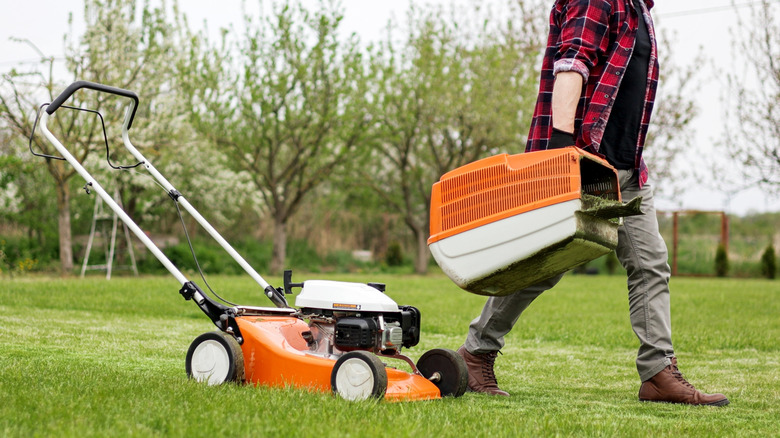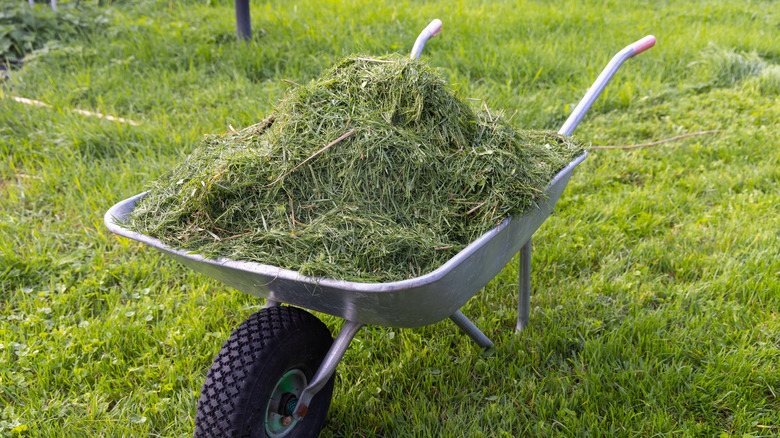What You Should Know Before Using Grass Clippings As An Odor Remover For Your Garden
We may receive a commission on purchases made from links.
There's nothing quite like the sweet, earthy summertime smell of freshly cut grass. It's a scent so popular that it's found in scores of perfumes, room sprays, and candles, and it's tempting to think it could cover awful smells that could be coming from plants or animal waste in your yard. However, as anyone who has ever left a pile of clippings in their yard can tell you, fresh cut grass is a scent that can quickly go from sweet to highly unpleasant.
This is because grass, like other green organic materials, contains a lot of water. This high moisture level means grass becomes soggy and heavy as it decomposes and, if left alone in a pile in your yard or spread in a too-thick layer on your garden, is prone to rapidly rotting. So, before using grass clippings to try to disguise the not-so-fresh scent of your compost pile, or the coffee grounds you sprinkled to fertilize your flower beds, it's important to know how to – and how not to – handle your grass clippings to keep your garden and yard smelling summertime sweet.
How to properly use grass clippings in your yard
The good news is there are easy ways to keep the smell of fresh grass in your yard. One is to cut your lawn often, especially in late spring and early summer when it tends to grow faster. More frequent mowing produces shorter clippings – you ideally want them about 1 inch long or less – that decompose easier, and are less prone to rotting. Better still, try using a special mower to mulch your grass. Aptly called a mulching mower, it has multiple blades that chop each blade of grass numerous times, creating tiny cuttings that form a layer of natural fertilizer on the turf. This method is also known as grasscycling, and is a sustainable, chemical-free way to feed nutrients to your lawn. Another perk is that this is one of the best ways to mow your lawn more efficiently, since it saves you the time you'd spend bagging and disposing of clippings.
If adding grass clippings to your garden, use thin layers, ideally no thicker than ¼ inch. Any denser and the grass will likely become a clumpy, smelly problem before it's able to break down. Another option is to mix in some brown material like dead leaves, cardboard or twigs, before spreading. Ideally, you want a ratio of 1/3 grass clippings to 2/3 brown material. This mixture will help to increase airflow and prevent excess moisture, while the carbon in the brown material will prevent nitrogen-rich grass clippings from developing that putrid smell.
Other ways to keep your garden smelling fresh
If grass clippings aren't enough to solve your odor problems, there are other ways to keep your garden smelling fresh. Start by checking for drainage issues, since standing water invites foul-smelling bacteria to grow. In areas where water is puddling, you may see plant material starting to decay before you notice the smell. Aerating your garden will allow more oxygen to the roots and introduces air pockets to the soil for better drainage. A simpler fix could be sprinkling a pet deodorizer, like this natural yard odor remover from Smelleze, around your garden and lawn to absorb pet and other smells. For a homemade remedy, try dissolving two tablespoons of baking soda in a gallon of water and putting the mixture on odorous areas.
There are also many plants that can cover those not-so-great yard smells. Lavender, lemon balm, mint, – although mint is invasive and best planted in containers – or rosemary are all good, fragrant choices. It's also important to frequently examine your garden for sour-smelling culprits like dying plants or rotting vegetables and remove them as quickly as possible.


